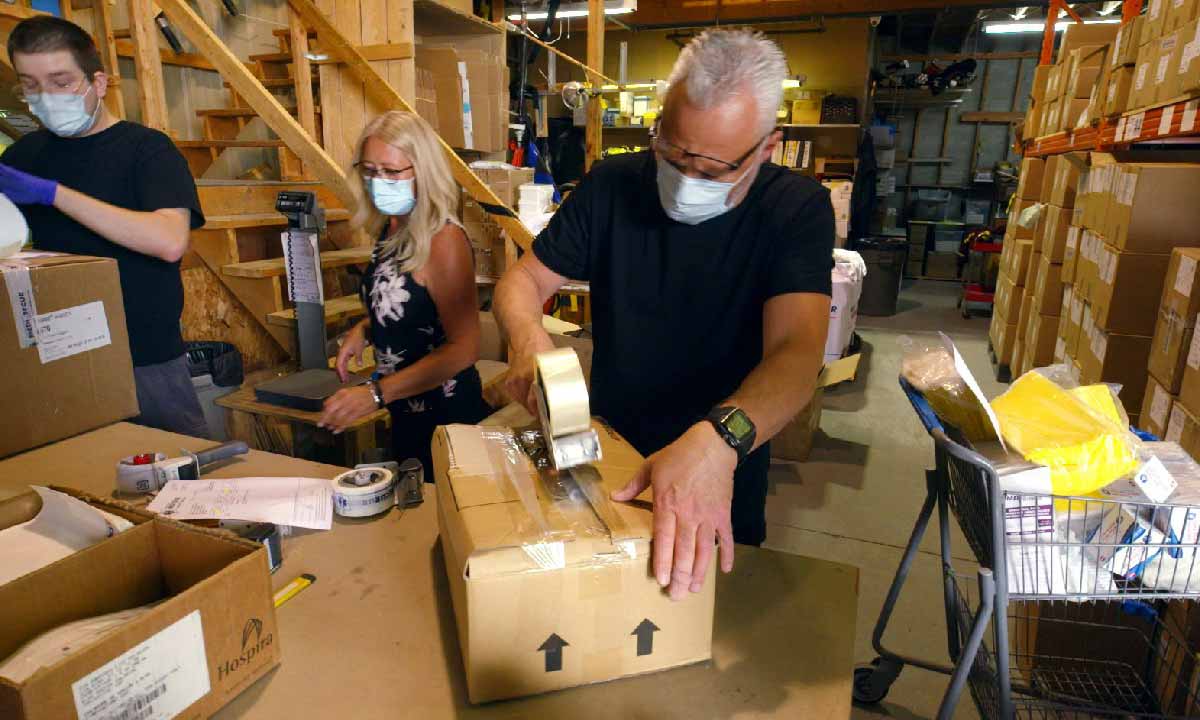In business, change is inevitable. But the COVID-19 pandemic brought about a level of change that businesses couldn’t foresee or plan for. Our #SmallBusinessRedefined series showcases small businesses that have found ways to reimagine their business through new opportunities – whether it’s through a new product, a new market, or a new way to fulfill. Learn how these Canadian businesses have pivoted to adapt, innovate and thrive in a changing and uncertain environment.
Before the COVID-19 pandemic, Medi-Secur was a busy, functioning company serving essential services such as first responders, paramedics, and fire and police departments in Ontario and Quebec. Since mid-February, they have been off-the-charts busy, working 7 days a week non-stop to ensure they had sufficient product and inventory to fill client demand.
“We noticed demand rising in February as COVID-19 spread through China and elsewhere,” says Joel Forget, manager at Medi-Secur, whose parents started the company in 2006. “We knew it was going to come to Quebec one day. We prepared the best we could, but we couldn’t anticipate how big the crisis would be here.”
The team started to notice concerning inventory trends with some products, and knew they weren’t going to be able to keep up with the growing needs of their customers. Because they were in regular contact with their clients, they knew that the need for certain products was going to continue to rise. At the same time, they saw their supply chain dry up. For example, they used to receive regular shipments of disposable medical gowns, but as of the end of June, they hadn’t received a single gown since January. The team realized they needed to think differently if they were going to continue to supply their clients – many of whom are front line workers – with the critical PPE they needed to stay safe during the pandemic
How Innovation and a Quick Pivot Kept Essential Workers Equipped
Medi-Secur had to find a new way to get supplies to their customers, as critical inventory was just not coming in from their usual suppliers. “We couldn’t afford for our customers to feel unsafe,” says Forget. “So we had to brainstorm to come up with innovative solutions to get them the protection they needed.”
This is how they came up with the idea of creating their own reusable medical gown.
“The gown is reusable, solid, easily washable and water repellent,” explains Forget. “Liquids don’t stay on the surface, which is very important for medical protection purposes.”
Given their close ties to the medical community, and familiarity with their needs, Medi-Secur was able to come up with a prototype within 2-3 weeks. Working with a local manufacturer, they were able to quickly produce the reusable medical gown, which they have been selling for the last two months. Their only initial challenge was scaling up production to meet the demand of their innovative new product. Now that they’re in full production, however, they can meet all their client orders.
In addition to front-line workers, Medi-Secur is now serving other businesses as well, including restaurants, dental clinics and hair salons. “A lot of businesses we wouldn’t have thought of before have come to us. We have been able to provide them with the products they need for their protection,” says Forget.
Lessons Learned
Forget credits the success and resilience of their business through the crisis to a few things. First, by paying close attention to inventory and monitoring their supply chain, they identified the risks very early.
Second, by knowing their clients and local market, they could understand the demand for PPE even before it reached critical levels.
Third, their ability to use local suppliers meant they could get the product manufactured reliably, without having to count on a disrupted foreign supply chain.
And finally, being a small, agile team allowed them to brainstorm and come up with ideas quickly.
“We really had to come up with innovative solutions to try to match the demand for our customers. We are a small team, but we were able to achieve a lot in a short time. Being a small business made us more agile during this time of crisis,” says Forget.
“Small businesses can have a strong impact in uncertain times,” he reminds. “We are an example of that.”
Learn how other Canadian businesses pivoted to adapt, innovate and thrive in our current changing and uncertain times.
This article is intended as general information only and is not to be relied upon as constituting legal, financial or other professional advice. A professional advisor should be consulted regarding your specific situation. Information presented is believed to be factual and up-to-date but we do not guarantee its accuracy and it should not be regarded as a complete analysis of the subjects discussed. All expressions of opinion reflect the judgment of the authors as of the date of publication and are subject to change. No endorsement of any third parties or their advice, opinions, information, products or services is expressly given or implied by Royal Bank of Canada or any of its affiliates.



















